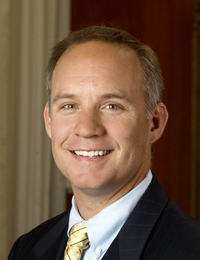Results of Physical Activity Study in Older Adults Poised to Change How Healthcare in the U.S. is Practiced and Reimbursed
For more information, contact our Media Relations Manager, Ted Griggs, 225-763-2862 or our Communications Director, Lisa Stansbury, at 225-763-2978. Our news email box is also available at news@pbrc.edu.
Pennington Biomedical Among Elite Group of Research Institutions Unveiling FindingsReleased: Tuesday, May 27, 2014
BATON ROUGE, LA - Daily physical activity, like walking, can assist older adults in living healthier and more mobile lives for longer according to a study completed at Pennington Biomedical Research Center.
 Timothy Church, M.D., M.P.H., Ph.D.
Timothy Church, M.D., M.P.H., Ph.D.John S. McIlHenny Endowed Chair in Health Wisdom
The ability to move around successfully is critical to independent living and improved quality of life for our aging population. Older adults who participate in 20 minutes a day of moderate physical activity have been shown to maintain their ability to walk at a rate of 18% higher than those who do not exercise.
"This research is poised to change how health care is practiced and reimbursed in this country," said Dr. Tim Church, Pennington Biomedical's principal investigator for The LIFE Study. "The results encourage health care providers to include physical activity in conjunction with disease treatment to improve quality of life as we age."
The Lifestyle Interventions and Independence for Elders - or The LIFE Study - took place across eight field centers including the University of Florida, Jacksonville Brooks Rehabilitation, Northwestern University, LSU's Pennington Biomedical, University of Pittsburg, Stanford University, Tufts University, Wake Forest School of Medicine, and Yale University. Additional follow-up on the study will continue in the year ahead.
Research results from this long-term, groundbreaking study will be published in the May edition of the Journal of the American Medical Association and will be presented at 1 p.m. on May 27 at the annual meeting of the American College of Sports Medicine in Orlando, Florida.
Researchers showed that prescribed daily physical activity would prevent older adults' loss of mobility, defined in the study as the ability to walk 400 meters or about a quarter of a mile. Although 400 meters might sound like an arbitrary number, it's an important distance for older adults according to researchers because it is approximately equal to a trip from a parked car to a grocery store or a walk through a neighborhood.
Researchers recruited 1,635 sedentary men and women aged 70-89 for the study. Researchers found that participants could walk a quarter mile within 15 minutes but were at risk for losing that ability. Low physical performance can be a predictor of early death and higher hospitalization and institutionalization rates. Historically, patients with low physical performance are not often recruited to large studies.
Moderate physical activity not only helped older adults maintain mobility but also helped prevent the occurrence of long-term mobility loss. Researchers found a 28% reduction in people permanently losing the ability to walk easily.
"This demonstrates the power of physical activity in maintaining quality of life as we age," added Church. "And it proves that it's never too late to benefit from starting a physical activity program. Given the ever increasing size of this portion of our population, this study has great public health and clinical implications."
This study was also an economic generator for the Baton Rouge area. Underway for the past several years, the LIFE Study award granted to Pennington Biomedical alone has totaled $6.17M to date, equating to 22-23 full time jobs in our community during each year of the study.
"The size of the study and the high risk nature of the participants involved is unique," said Church. "I am very proud of our team on the ground here in Baton Rouge including our local partners BREC, YMCA and Baton Rouge General Physicians. This study was comprised of a select group of research intuitions with an extremely challenging study protocol and our team represented Pennington Biomedical and Baton Rouge very well on this national stage."
For additional information on The LIFE Study, visit www.thelifestudy.org. A National Institutes of Health and National Institute on Aging Cooperative Agreement funded the study. The National Heart, Lung and Blood Institute provided additional support.###
The Pennington Biomedical Research Center is at the forefront of medical discovery as it relates to understanding the triggers of obesity, diabetes, cardiovascular disease, cancer and dementia. It is a campus of Louisiana State University and conducts basic, clinical and population research. The research enterprise at Pennington Biomedical includes approximately 80 faculty and more than 25 post-doctoral fellows who comprise a network of 44 laboratories supported by lab technicians, nurses, dietitians, and support personnel, and 13 highly specialized core service facilities. Pennington Biomedical's more than 500 employees perform research activities in state-of-the-art facilities on the 222-acre campus located in Baton Rouge, Louisiana.


